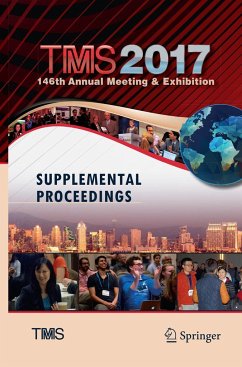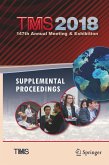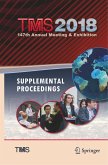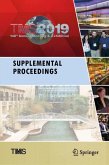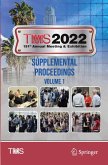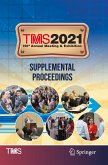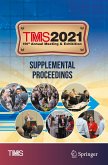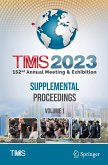TMS 2017 146th Annual Meeting & Exhibition Supplemental Proceedings
Herausgegeben:TMS, The Minerals, Metals & Materials Society
TMS 2017 146th Annual Meeting & Exhibition Supplemental Proceedings
Herausgegeben:TMS, The Minerals, Metals & Materials Society
- Broschiertes Buch
- Merkliste
- Auf die Merkliste
- Bewerten Bewerten
- Teilen
- Produkt teilen
- Produkterinnerung
- Produkterinnerung
This collection features papers presented at the 146th Annual Meeting & Exhibition of The Minerals, Metals & Materials Society.
Andere Kunden interessierten sich auch für
![TMS 2018 147th Annual Meeting & Exhibition Supplemental Proceedings TMS 2018 147th Annual Meeting & Exhibition Supplemental Proceedings]() TMS 2018 147th Annual Meeting & Exhibition Supplemental Proceedings237,99 €
TMS 2018 147th Annual Meeting & Exhibition Supplemental Proceedings237,99 €![TMS 2018 147th Annual Meeting & Exhibition Supplemental Proceedings TMS 2018 147th Annual Meeting & Exhibition Supplemental Proceedings]() TMS 2018 147th Annual Meeting & Exhibition Supplemental Proceedings164,99 €
TMS 2018 147th Annual Meeting & Exhibition Supplemental Proceedings164,99 €![TMS 2019 148th Annual Meeting & Exhibition Supplemental Proceedings TMS 2019 148th Annual Meeting & Exhibition Supplemental Proceedings]() TMS 2019 148th Annual Meeting & Exhibition Supplemental Proceedings276,99 €
TMS 2019 148th Annual Meeting & Exhibition Supplemental Proceedings276,99 €![TMS 2022 151st Annual Meeting & Exhibition Supplemental Proceedings TMS 2022 151st Annual Meeting & Exhibition Supplemental Proceedings]() TMS 2022 151st Annual Meeting & Exhibition Supplemental Proceedings226,99 €
TMS 2022 151st Annual Meeting & Exhibition Supplemental Proceedings226,99 €![TMS 2021 150th Annual Meeting & Exhibition Supplemental Proceedings TMS 2021 150th Annual Meeting & Exhibition Supplemental Proceedings]() TMS 2021 150th Annual Meeting & Exhibition Supplemental Proceedings267,49 €
TMS 2021 150th Annual Meeting & Exhibition Supplemental Proceedings267,49 €![TMS 2021 150th Annual Meeting & Exhibition Supplemental Proceedings TMS 2021 150th Annual Meeting & Exhibition Supplemental Proceedings]() TMS 2021 150th Annual Meeting & Exhibition Supplemental Proceedings202,99 €
TMS 2021 150th Annual Meeting & Exhibition Supplemental Proceedings202,99 €![TMS 2023 152nd Annual Meeting & Exhibition Supplemental Proceedings TMS 2023 152nd Annual Meeting & Exhibition Supplemental Proceedings]() TMS 2023 152nd Annual Meeting & Exhibition Supplemental Proceedings242,99 €
TMS 2023 152nd Annual Meeting & Exhibition Supplemental Proceedings242,99 €-
-
-
This collection features papers presented at the 146th Annual Meeting & Exhibition of The Minerals, Metals & Materials Society.
Produktdetails
- Produktdetails
- The Minerals, Metals & Materials Series
- Verlag: Springer / Springer International Publishing / Springer, Berlin
- Artikelnr. des Verlages: 978-3-319-84665-1
- Softcover reprint of the original 1st ed. 2017
- Seitenzahl: 836
- Erscheinungstermin: 4. Mai 2018
- Englisch
- Abmessung: 235mm x 155mm x 45mm
- Gewicht: 1258g
- ISBN-13: 9783319846651
- ISBN-10: 3319846655
- Artikelnr.: 53572265
- Herstellerkennzeichnung Die Herstellerinformationen sind derzeit nicht verfügbar.
- The Minerals, Metals & Materials Series
- Verlag: Springer / Springer International Publishing / Springer, Berlin
- Artikelnr. des Verlages: 978-3-319-84665-1
- Softcover reprint of the original 1st ed. 2017
- Seitenzahl: 836
- Erscheinungstermin: 4. Mai 2018
- Englisch
- Abmessung: 235mm x 155mm x 45mm
- Gewicht: 1258g
- ISBN-13: 9783319846651
- ISBN-10: 3319846655
- Artikelnr.: 53572265
- Herstellerkennzeichnung Die Herstellerinformationen sind derzeit nicht verfügbar.
The Minerals, Metals & Materials Society (TMS) is a member-driven international professional society dedicated to fostering the exchange of learning and ideas across the entire range of materials science and engineering, from minerals processing and primary metals production, to basic research and the advanced applications of materials. Included among its nearly 13,000 professional and student members are metallurgical and materials engineers, scientists, researchers, educators, and administrators from more than 70 countries on six continents.
Part 1: 2017 Symposium on Functional Nanomaterials: Emerging Nanomaterials and Nanotechnology.- High-performance Supercapacitors Based on Hierarchical VOx Microspheres Forming from Hyperbranched Nanoribbons.- Potential of Magnetotactic Bacteria for the Fabrication of Iron Nanoparticles.- Facile Green Synthesis and Characterization of Water-soluble Superparamagnetic Iron Oxide Nanoparticles-gold Porphyrin Conjugate for Improved Photodynamic Therapy.- Synthesis of AgNP's from Industrial Wastes.- Synthesis of Mn2O3 Nanopowders with Urea and Citric Acid by Solution Combustion Route.- Part 2: Additive Manufacturing of Metals: Establishing Location-Specific Processing-Microstructure-Property Relationships.- Evolution of Aluminum Alloys Structure at Production Phases of 3D Products by Methods of Additive Technologies.- Characterization of Multiperforated Plates Manufactured by SLM and EBM for Aeroengine Applications.- Direct Laser Metal Deposition of Eutectic Al-Si Alloy for Automotive Applications.- Additive Manufacturing to Produce Standard and Custom Alloy Titanium.- Aiming for Modeling-assisted Tailored Designs for Additive Manufacturing.- Part 3: Additive Manufacturing: Building the Pathway towards Process and Material Qualification.- The Use of Laser Ultrasound to Detect Defects in Laser Melted Parts.- SLM Process Variables and Part Geometry Optimization Based on Numerical Prediction of Process Induced Distortions.- Optimizing, Fabricating and Characterizing Additively Manufactured Process Tubing.- Scaling Relationships for Direct Ink Writing with Acoustic Focusing.- The Influence of Gas Cooling in Context of Wire Arc Additive Manufacturing: A Novel Strategy of Affecting Grain Structure and Size.- Microstructure and Mechanical Properties of Laser Deposited Ni/WC Metal Matrix Composite Coatings.- Composite Powder Consolidation Using Selective Laser Melting: Input Energy/Porosity Morphology/Balling Effect Relation.- Part 4: Advanced Characterization Techniques for Quantifying and Modeling Deformation Mechanisms.- Strain Localization Structures in Textured Magnesium AZ31 under Reversed Loading via Multi-scale Digital Image Correlation.- Deformation and Strengthening Mechanisms in AISI 321 Austenitic Stainless Steel under both Dynamic and Quasi-static Loading Conditions.- Analysis of Dislocation Structures in Ferritic and Dual Phase Steels Regarding Continuous and Discontinuous Loading Paths.- Microstructural Characterization of Inconel 600 Tubes after Tensile Tests at Various Temperatures and Strain Rates.- Part 5: Advanced High-Strength Steels.- Influences of Thermomechanical Treatments on the Microstructure Evolution and Mechanical Properties of Nano-precipitates Strengthened Steels.- Effects of Solid Solution Treatment on the Microstructure and Mechanical Properties in the Ultra-high Strength Steel Strengthened by Nanoscale Particles.- Effects of Microstructure on the Strain Rate Sensitivity of Advanced Steels.- Part 6: Advanced Materials in Dental and Orthopedic Applications.- Characterization of Chitin Synthesized from Snail Shell.- Titanium-magnesium Composite for Dental Implants (BIACOM).- Part 7: Alloys and Compounds for Thermoelectric and Solar Cell Applications V.- Thermoelectric Behaviour of Polyvinyl Acetate /CNT Composites.- Part 8: Applications of Solidification Fundamentals.- Microstructure Characteristics of A356 Nanocomposites Manufactured Via Ultrasonic Cavitation Processing under Controlled Solidification Conditions.- Part 9: Biological Materials Science.- Development of Sponge Structure and Casting Conditions for Absorbable Magnesium Bone Implants.- Osteoporosis and fatigue fracture prevention by analysis of bone microdamage.- Bone Remodeling under Tooth Loading.- Investigating Biochemical Constituents of Cymbopogon citratus Leaf: Prospects on Total Corrosion of Concrete Steel-rebar in Acidic-Sulphate Medium.- Two-step sintering effects on the microstructure and mechanical properties of forsterite scaffolds.- Part 10: Bulk Metallic Glasses XIV.- Material Behavior in Micro Milling of Zirconium based Bulk Metallic Glass.- Part 11: Computational Thermodynamics and Kinetics.- Comparison of the Phase-field Models to Predict the Recrystallization Kinetics.- Surface Reaction and Transport in Oxides Formed on FeCrAl Alloys in High Temperature Nitridation Environments.- Atomic Scale Modeling of Fe-Al-Mn-C Alloy using Pair Models and Monte-Carlo Calculations.- Control Technique Study of Non-metallic Inclusions in Low Carbon Steel by Rare Earth Final Deoxidization.- Effect of Cooling Rate on Phase Transformation and Microstructure Evolution in a Large Size Forged Ingot of Medium Carbon Low Alloy Steel.- Formation and Control of CaS Inclusion in Gear Steel 20MnCr5.- Investigations on the Mechanical Deformation of Amorphous Alloy Nanowires Using Phase-field Modeling and Thermodynamics Avalanche Models.- Thermodynamic Modeling of Al-Fe-Cr Ternary System.- Part 12: Defects and Properties of Cast Metals.- AModeling and Experimental Investigation on the Formation of Acicular Silicon and Sludge in High Pressure Die Casting of a Modified A383 Alloy.- Hot-tearing of Multicomponent Al-Cu Alloys Based on Casting Load Measurements in a Constrained Permanent Mold.- Effect of Molybdenum Content, Pouring Temperature and Cooling Rate on the Casting Defects of High Chromium White Cast Iron.- Effect of Various Aluminum Content on the Formation of Inclusion.- Effect of Segregated Alloying Elements on the High Strength Steel Properties: Application to the Large Size Ingot Casting Simulation.- Thermal-Mechanical Model of Depression Formation in Steel Continuous Casting.- Study for the Initiation Locations of Longitudinal Surface Cracks on Beam Blank in the Mold of Continuous Casting.- The Influence of SEN and Upper Nozzle Design on the Flow Character for the Slab Quality.- Effect of the Addition of Ce and Si on the Hot Cracking Behavior of SiMn Alloy during the Solidification Process.- Modeling and Predication of Shrinkage Porosity Formation in Steel Ingot.- Numerical Analysis of Coupled Turbulent Flow and Macroscopic Solidification in a Billet Continuous Casting Mold with Electromagnetic Stirring.- Part 13: Environmentally Assisted Cracking: Theory and Practice.- Hydrogen embrittlement and hydrogen-enhanced strain-induced vacancies in a-iron.- Factors causing hydrogen embrittlement of cold-drawn pearlitic steel fractured under elastic/plastic region.- Corrosion of Nickel-Titanium, C110, and Al6061 in Gallium-based Liquid Metal Alloys.- Part 14: General Poster Session.- Synthesis and characterization of Al-B4C powders by mechanical alloying.- Direct Conversion of Celestite to SrCO3 by Wet Milling.- Part 15: High Temperature Electrochemistry III.- Electrochemistry in Molten LiF-BeF2 Salt for Fluoride Salt-Cooled High Temperature Reactor Applications.- Impurity Removal from Titanium Oxycarbide.- Next-Generation Molten Oxide Energy Materials R&D.- Effects of Oxide Precursor Preparation Parameters on the Electrochemical Reduction of Tantalum Pentoxide in Calcium Chloride Melt.- The Effect of Temperature on Electrochemical Codeposition of Mg-Ni Hydrogen Storage Alloys from Molten Salt System.- Part 16: Materials and Fuels for the Current and Advanced Nuclear Reactors VI.- Diffusion Studies in the Development of an FCCI Barrier for High-Burnup Metallic Nuclear Fuel.- Part 17: Materials Engineering of Soft Magnets for Power and Energy Applications.- Development of Mold Inductor for Power Conversion System.- Effect of Annealing Time on the Texture of a 2.8% Si Non-Oriented Electrical Steel after Inclined and Skew Rolling.- Multi-parameter Magnetic Material Characterization for High Power Medium Frequency Converters.- Part 18: Phase Transformations and Microstructural Evolution.- An Experimental Assessment of the a +a' Miscibility Gap in Fe-Cr.- Phase Transformation, Microstructural Evolution and Property Modification in Rapidly Solidified Grey Cast Iron.- Morphologyof Order-disorder Structures in Rapidly Solidified L12intermetallics.- Part 19: Recent Developments in Biological, Structural and Functional Thin Films and Coatings.- Development of Enamel Coatings in Accordance with Recent Regulations of Food Contact Materials.- Transmission Probability of Diffusing Particles - A Case Study.- Preparation of Porous Titanium Oxide Film by Sol-Gel Method.- Part 20: Solid State Precipitation.- Hydride Precipitates in Zirconium Alloys: Evolution of Dissolution and Precipitation Temperatures during Thermal Cycling Correlated to Microstructure Features.- Analysis of Beta´ Cu4Ti Precipitation in Cu-Ti Alloys by Conventional and Diffusion-couple Methods.- Carbide Precipitation in a Low-alloy Ferritic Steel.- Part 21: Student-Run Symposium: Building Bridges - Connecting Academic and Industry Research.- Fundamental Principles for a Successful Collaboration between University and Metalworking Industries.
Part 1: 2017 Symposium on Functional Nanomaterials: Emerging Nanomaterials and Nanotechnology.- High-performance Supercapacitors Based on Hierarchical VOx Microspheres Forming from Hyperbranched Nanoribbons.- Potential of Magnetotactic Bacteria for the Fabrication of Iron Nanoparticles.- Facile Green Synthesis and Characterization of Water-soluble Superparamagnetic Iron Oxide Nanoparticles-gold Porphyrin Conjugate for Improved Photodynamic Therapy.- Synthesis of AgNP's from Industrial Wastes.- Synthesis of Mn2O3 Nanopowders with Urea and Citric Acid by Solution Combustion Route.- Part 2: Additive Manufacturing of Metals: Establishing Location-Specific Processing-Microstructure-Property Relationships.- Evolution of Aluminum Alloys Structure at Production Phases of 3D Products by Methods of Additive Technologies.- Characterization of Multiperforated Plates Manufactured by SLM and EBM for Aeroengine Applications.- Direct Laser Metal Deposition of Eutectic Al-Si Alloy for Automotive Applications.- Additive Manufacturing to Produce Standard and Custom Alloy Titanium.- Aiming for Modeling-assisted Tailored Designs for Additive Manufacturing.- Part 3: Additive Manufacturing: Building the Pathway towards Process and Material Qualification.- The Use of Laser Ultrasound to Detect Defects in Laser Melted Parts.- SLM Process Variables and Part Geometry Optimization Based on Numerical Prediction of Process Induced Distortions.- Optimizing, Fabricating and Characterizing Additively Manufactured Process Tubing.- Scaling Relationships for Direct Ink Writing with Acoustic Focusing.- The Influence of Gas Cooling in Context of Wire Arc Additive Manufacturing: A Novel Strategy of Affecting Grain Structure and Size.- Microstructure and Mechanical Properties of Laser Deposited Ni/WC Metal Matrix Composite Coatings.- Composite Powder Consolidation Using Selective Laser Melting: Input Energy/Porosity Morphology/Balling Effect Relation.- Part 4: Advanced Characterization Techniques for Quantifying and Modeling Deformation Mechanisms.- Strain Localization Structures in Textured Magnesium AZ31 under Reversed Loading via Multi-scale Digital Image Correlation.- Deformation and Strengthening Mechanisms in AISI 321 Austenitic Stainless Steel under both Dynamic and Quasi-static Loading Conditions.- Analysis of Dislocation Structures in Ferritic and Dual Phase Steels Regarding Continuous and Discontinuous Loading Paths.- Microstructural Characterization of Inconel 600 Tubes after Tensile Tests at Various Temperatures and Strain Rates.- Part 5: Advanced High-Strength Steels.- Influences of Thermomechanical Treatments on the Microstructure Evolution and Mechanical Properties of Nano-precipitates Strengthened Steels.- Effects of Solid Solution Treatment on the Microstructure and Mechanical Properties in the Ultra-high Strength Steel Strengthened by Nanoscale Particles.- Effects of Microstructure on the Strain Rate Sensitivity of Advanced Steels.- Part 6: Advanced Materials in Dental and Orthopedic Applications.- Characterization of Chitin Synthesized from Snail Shell.- Titanium-magnesium Composite for Dental Implants (BIACOM).- Part 7: Alloys and Compounds for Thermoelectric and Solar Cell Applications V.- Thermoelectric Behaviour of Polyvinyl Acetate /CNT Composites.- Part 8: Applications of Solidification Fundamentals.- Microstructure Characteristics of A356 Nanocomposites Manufactured Via Ultrasonic Cavitation Processing under Controlled Solidification Conditions.- Part 9: Biological Materials Science.- Development of Sponge Structure and Casting Conditions for Absorbable Magnesium Bone Implants.- Osteoporosis and fatigue fracture prevention by analysis of bone microdamage.- Bone Remodeling under Tooth Loading.- Investigating Biochemical Constituents of Cymbopogon citratus Leaf: Prospects on Total Corrosion of Concrete Steel-rebar in Acidic-Sulphate Medium.- Two-step sintering effects on the microstructure and mechanical properties of forsterite scaffolds.- Part 10: Bulk Metallic Glasses XIV.- Material Behavior in Micro Milling of Zirconium based Bulk Metallic Glass.- Part 11: Computational Thermodynamics and Kinetics.- Comparison of the Phase-field Models to Predict the Recrystallization Kinetics.- Surface Reaction and Transport in Oxides Formed on FeCrAl Alloys in High Temperature Nitridation Environments.- Atomic Scale Modeling of Fe-Al-Mn-C Alloy using Pair Models and Monte-Carlo Calculations.- Control Technique Study of Non-metallic Inclusions in Low Carbon Steel by Rare Earth Final Deoxidization.- Effect of Cooling Rate on Phase Transformation and Microstructure Evolution in a Large Size Forged Ingot of Medium Carbon Low Alloy Steel.- Formation and Control of CaS Inclusion in Gear Steel 20MnCr5.- Investigations on the Mechanical Deformation of Amorphous Alloy Nanowires Using Phase-field Modeling and Thermodynamics Avalanche Models.- Thermodynamic Modeling of Al-Fe-Cr Ternary System.- Part 12: Defects and Properties of Cast Metals.- AModeling and Experimental Investigation on the Formation of Acicular Silicon and Sludge in High Pressure Die Casting of a Modified A383 Alloy.- Hot-tearing of Multicomponent Al-Cu Alloys Based on Casting Load Measurements in a Constrained Permanent Mold.- Effect of Molybdenum Content, Pouring Temperature and Cooling Rate on the Casting Defects of High Chromium White Cast Iron.- Effect of Various Aluminum Content on the Formation of Inclusion.- Effect of Segregated Alloying Elements on the High Strength Steel Properties: Application to the Large Size Ingot Casting Simulation.- Thermal-Mechanical Model of Depression Formation in Steel Continuous Casting.- Study for the Initiation Locations of Longitudinal Surface Cracks on Beam Blank in the Mold of Continuous Casting.- The Influence of SEN and Upper Nozzle Design on the Flow Character for the Slab Quality.- Effect of the Addition of Ce and Si on the Hot Cracking Behavior of SiMn Alloy during the Solidification Process.- Modeling and Predication of Shrinkage Porosity Formation in Steel Ingot.- Numerical Analysis of Coupled Turbulent Flow and Macroscopic Solidification in a Billet Continuous Casting Mold with Electromagnetic Stirring.- Part 13: Environmentally Assisted Cracking: Theory and Practice.- Hydrogen embrittlement and hydrogen-enhanced strain-induced vacancies in a-iron.- Factors causing hydrogen embrittlement of cold-drawn pearlitic steel fractured under elastic/plastic region.- Corrosion of Nickel-Titanium, C110, and Al6061 in Gallium-based Liquid Metal Alloys.- Part 14: General Poster Session.- Synthesis and characterization of Al-B4C powders by mechanical alloying.- Direct Conversion of Celestite to SrCO3 by Wet Milling.- Part 15: High Temperature Electrochemistry III.- Electrochemistry in Molten LiF-BeF2 Salt for Fluoride Salt-Cooled High Temperature Reactor Applications.- Impurity Removal from Titanium Oxycarbide.- Next-Generation Molten Oxide Energy Materials R&D.- Effects of Oxide Precursor Preparation Parameters on the Electrochemical Reduction of Tantalum Pentoxide in Calcium Chloride Melt.- The Effect of Temperature on Electrochemical Codeposition of Mg-Ni Hydrogen Storage Alloys from Molten Salt System.- Part 16: Materials and Fuels for the Current and Advanced Nuclear Reactors VI.- Diffusion Studies in the Development of an FCCI Barrier for High-Burnup Metallic Nuclear Fuel.- Part 17: Materials Engineering of Soft Magnets for Power and Energy Applications.- Development of Mold Inductor for Power Conversion System.- Effect of Annealing Time on the Texture of a 2.8% Si Non-Oriented Electrical Steel after Inclined and Skew Rolling.- Multi-parameter Magnetic Material Characterization for High Power Medium Frequency Converters.- Part 18: Phase Transformations and Microstructural Evolution.- An Experimental Assessment of the a +a' Miscibility Gap in Fe-Cr.- Phase Transformation, Microstructural Evolution and Property Modification in Rapidly Solidified Grey Cast Iron.- Morphologyof Order-disorder Structures in Rapidly Solidified L12intermetallics.- Part 19: Recent Developments in Biological, Structural and Functional Thin Films and Coatings.- Development of Enamel Coatings in Accordance with Recent Regulations of Food Contact Materials.- Transmission Probability of Diffusing Particles - A Case Study.- Preparation of Porous Titanium Oxide Film by Sol-Gel Method.- Part 20: Solid State Precipitation.- Hydride Precipitates in Zirconium Alloys: Evolution of Dissolution and Precipitation Temperatures during Thermal Cycling Correlated to Microstructure Features.- Analysis of Beta´ Cu4Ti Precipitation in Cu-Ti Alloys by Conventional and Diffusion-couple Methods.- Carbide Precipitation in a Low-alloy Ferritic Steel.- Part 21: Student-Run Symposium: Building Bridges - Connecting Academic and Industry Research.- Fundamental Principles for a Successful Collaboration between University and Metalworking Industries.

